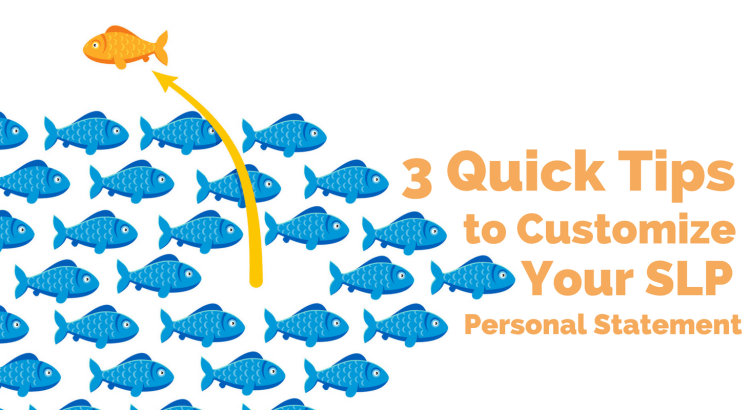They say you should not use a cookie cutter personal statement that you send to each and every graduate school for speech language pathology.
In this post, I am going to give you some tips and tricks on how to customize your personal statement for each school without having to completely re-write it for each one.
1. Research the Department You’re Applying to!
In my interview with Treasyri (a practicing SLP and blogger: TheSpeechMentor), she described finding a graduate school like dating, and I think it is a great analogy. Imagine you get one date to decide if you want to spend 2 years with someone.
Scary, right?
Well that is what a school is basing their decision on! Now imagine you’re on that date and the person sitting across from you blurts out, “You’re perfect for me. I’ve dreamed about you since I was in high school. I’ve always known I wanted to be with you.” Do you believe any of it? So why would you use those same boring, hackneyed, empty phrases with a graduate school in your personal statement (a.k.a. on your first date)?
You need to research the school in mind and express why it is a good fit for you. Express those reasons clearly in your statement. Are they one of the few schools with a bilingual program? That’s a perfect fit. Do they have a unique clinical rotation, like working with voice feminization? Is there a leading dysphagia or adult neurogenic researcher on the faculty? You should mention your overlapping research interests. It is okay if you’re not sure yet. Speech pathology is a wide field. If you say you’re interested in a specific area, you’re not committing to anything yet.
Where do you find all of this info? Start on the web page for the department. Read their about page, their mission statement, and anything else you can get your hands on. Most faculty have at least a brief paragraph describing their research interests on the department website.
If you can, get ahold of current students and ask them about their experience. Which stuff is emphasized across classes? What do the professors really care about? How does it feel to be in school there? Do you feel supported, pushed, like your faculty care about your education?
2. Know The University Too!
Most graduate programs are pretty independent from the main university. You’re often taken classes only within your department because the stuff you’re learning is highly specialized. Despite this, the wider university culture still influences the department you’re in. So just like you researched the department, research the university.
Is it a liberal arts university? If yes, interdisciplinary studies will likely be highly valued. Can you incorporate that into your personal statement? If the university is a research institution, you should mention research in your essay. Find anything you can about the university’s culture that could help prove that you’re a good fit.
3. Drop a name or two…. And spell it right!
If you’ve identified an area of interest (voice, child language, adult neuro, bilingualism, etc) be sure to mention faculty you’d be interested in working with, by name! You can have a sentence like, “It would love the opportunity to more closely observe Dr. Sally’s research on melodic intonation therapy,” or “It would be a privilege to study under Dr. Bob as he continues his research in quality of life measures in disfluency.” These short statements go a long way to showing that you’ve really looked at a school closely and you’re picking it for a reason, not simply because you’re desperate.
Apart from specific faculty, mention the name of the university itself! You’d be surprised how many people don’t.
Oh, and be sure to spell the names correctly. Seriously – triple check it.
SO there you have it! My three quick tips to help customize your personal statement as you’re applying to graduate school for speech-language pathology.


I’d private message you this if I could, but since you talked about proofreading the personal statement. . .
Your first tip is labeled #3. And in the actual 3rd tip, you wrote “too” for “two”– unless that was a deliberate play on words?
Thank you for your advice! I’ve been reading your blogs like crazy.
How embarrassing on my part! BUT thank you for letting me know 🙂 Corrections made! You’re always welcome to reach me through the contact page.